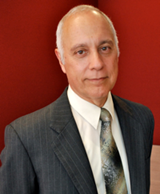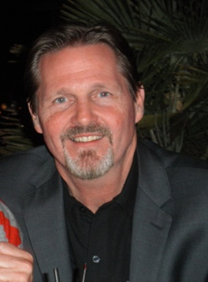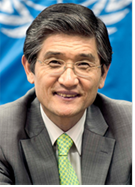Achieving global goals for poverty reduction, economic growth and environmental health will...
Plenary Speaker Information
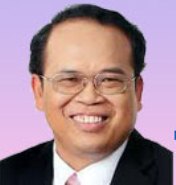 |
Dr. Wijarn Simachaya is Secretary-General of the Thailand Office of the Natural Resources and Environmental Policy and Planning of the Ministry of Natural Resources and Environment. Dr. Simachaya opened the conference on behalf of His Excellency Mr. Preecha Rengsomboonsuk Minister of Natural Resources and Environment of Thailand. Among other duties, Dr. Simachaya is responsible for establishing systems for pollution prevention and management, biodiversity conservation, improving policies and legislation related to environmental technology, and encouraging cooperation on pollution control technology and environmental analysis. He studied Science (Chemistry) at Chiang Mai University, Law at Ramkhumheang University, has a Graduate Diploma in Sanitary Engineering from Chulalongkorn University, an MSc. in Environmental Science from Kasetsart University and a Ph.D. in Environmental Engineering from the University of Guelph, Canada (1999). |
|
|
Dr. Michael Yates became the new mission director for USAID’s Regional Development Mission for Asia (RDMA) in Bangkok in May 2011. In this capacity, he oversees regional programs in health, environment, economic growth and governance in South and Southeast Asia, as well as USAID’s other development assistance programs in China, Burma, Laos, Papua New Guinea and Thailand. Mike joined USAID in 1987 and is a Career Minister in the U.S. Government Foreign Service. Prior to assuming his position at USAID/RDMA he was the Senior Deputy Assistant Administrator in the Bureau for Economic Growth, Agriculture and Trade (EGAT). He has previously served as Mission Director in Afghanistan (2008-09), Bolivia (2005-08) and the Philippines (2002-05). Prior to joining USAID he spent six years in Haiti and carried out field research in rural Paraguay. He holds a Ph.D. in anthropology from Columbia University, New York. |
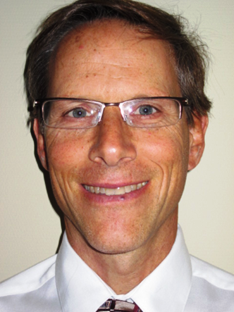 |
Ron Benioff serves as Manager of Multilateral Programs for the U.S. National Renewable Energy Laboratory (NREL). In this capacity he manages NREL’s work on clean energy and environmental and climate initiatives with international agencies and countries in all regions of the world. This includes serving as director of the LEDS Global Partnership Secretariat and of the Green Growth Best Practices Initiative and providing senior management leadership of the Clean Energy Solutions Center, a Clean Energy Ministerial initiative. Prior to joining NREL in 1997, he worked at the U.S. Environmental Protection Agency for 11 years on climate change and waste management issues. |
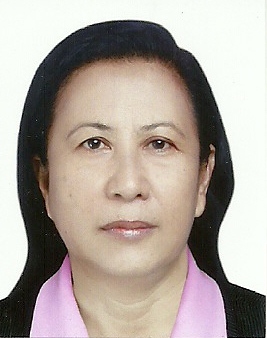 |
Ms. Joyceline A. Goco is currently the Deputy Executive Director of the Climate Change Office, Climate Change Commission. She also acts as the Project Manager of the Enhancing Capacity for Low Emission Development Strategies (EC-LEDS), Philippine Project. She was formerly the Head of the Interagency Committee on Climate Change and the Clean Development Mechanisms (CDM) Secretariat. She was instrumental in the establishment of the CDM Designate National Authority and the formulation of the National CDM Framework. She likewise coordinated the preparation of the Philippines’ 1st and 2nd National Communication on Climate Change. She has been presenting papers on climate change issues at the national and international conferences and fora and involved in the international climate change negotiation as member of the Philippine Delegation. |
|
|
David McCauley is ADB’s Lead Climate Change Specialist, responsible for providing policy and technical direction to ADB’s climate change programs at the project, country and regional levels. He also serves as focal point for work on reduced emissions from deforestation and degradation (or REDD), coordinates ADB climate change efforts with external parties, and serves as a frequent spokesperson for ADB’s climate change programs. Dr. McCauley has served as a senior consultant advisor to ADB, UNDP, UNEP, the World Bank, and others, having lived and worked in the Asia and the Pacific region for over 20 years, including as a resident of Sri Lanka, Indonesia, Kazakhstan and 7 years with ADB, based in the Philippines. Prior to joining ADB, he worked for the Ford Foundation, Harvard Institute for International Development, East-West Center, International Resources Group and USAID. He holds a PhD in resource economics from the University of Hawaii; with undergraduate training in environmental policy, biology and meteorology. |
|
|
Ambassador Raekwon Chung is the Director of the Environment and Development Division, United Nations Economic and Social Commission for Asia (UN ESCAP), and former Climate Change Ambassador of The Republic of Korea. Director Chung was a career diplomat of Korea specializing in global environmental negotiations attending major global conferences from Rio Earth Summit in 1992 to the Copenhagen Climate Conference (COP15) in 2009. As director of environment and development division, UN ESCAP, he initiated the concept of Green Growth as a strategy of harnessing environmental sustainability as a driver of rapid economic growth of Asia and the Pacific necessary to reduce poverty. As an input for Rio+20 Conference on Green Economy, in May 2012, he has prepared to launch an ESCAP Report titled “Low Carbon Green Growth Roadmap” as a blueprint for pursuing Green Economy necessary to cope with resource constraints and climate impacts already impacting many developing countries in Asia and the Pacific most. Having studied the Economics at Sungkyunkwan University in Korea, he completed his MA (Master of Science in Foreign Service) at Georgetown University in Washington DC. |
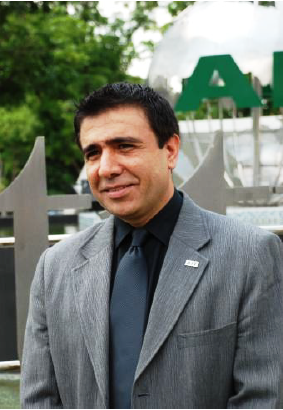 |
Professor Said Irandoust, a Swedish national, serving as President of the Asian Institute of Technology (AIT), an international institute of higher learning, based in Thailand with affiliated Centers in Vietnam and Indonesia. Professor Irandoust was born in 1960 in Tabriz, province of Azerbaijan, north-west of Iran. Professor Said Irandoust gained a M.Sc. and Ph.D. degree in chemical engineering at Chalmers. As President of AIT, Professor Irandoust has been instrumental in the financial rejuvenation of AIT and in the re-establishment of AIT as an international intergovernmental institute.Prior to joining AIT he was the Vice Chancellor of the University of Borås, Sweden from 2001–2005. During his presidency, the University of Borås developed a new, innovative concept to become the first Swedish University of Professions. Before that he worked with one of Sweden’s leading universities Chalmers from 1990 to 2000, with his last position being that of Vice President |
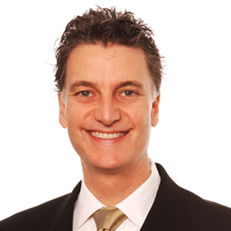 |
David Antonioli has more than 10 years experience working in the carbon market in a variety of different roles, having worked as a consultant with ICF International, a USAID representative in Mexico, and a project developer with EcoSecurities where he developed a portfolio of CDM landfill gas projects and led the company’s efforts in the voluntary sector.As the CEO of the Voluntary Carbon Standard Association (VCSA), David oversees the operations of the VCS, whose mission is to provide a rigorous, trustworthy and innovative global standard for the development of greenhouse gas offsets, and which is serving as the basis for the development of offset programs within compliance regimes worldwide. The VCS is one of the leading standards in the voluntary carbon market and, through its development of the buffer reserve mechanism, is widely credited for bringing REDD projects into the carbon market.David holds a Batchelor’s Degree from Princeton University and a Masters Degree in Public Policy from the John F. Kennedy School of Government (Harvard University). |
.

